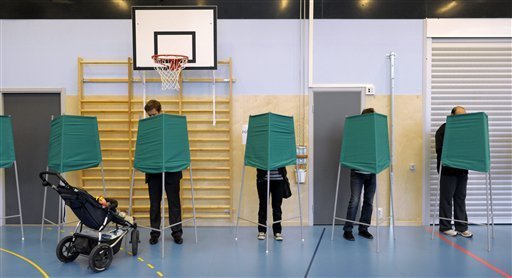
Sweden is left with a hung parliament after the country’s September 19 election. Although the current center-right alliance came out on top, commanding 172 of the Swedish Riksdag’s 349 seats, it fell short of an absolute majority. The leftwing opposition managed 157 seats, with the Social Democrats (in power for 65 of the past 78 years) achieving an almost 100 year low.
Most interestingly, the Swedish nationalist party, the Sweden Democrats, garnered 5.7 % of the vote, enabling the party to comfortably clear the 4 % hurdle for getting into parliament. The turnout gives the nationalists 20 seats, potentially putting this party in a position to make or break a government.
The Sweden Democrats’s result, hailed as “historic” by its members, comes as a severe disappointment to the established Swedish parties. During the recent campaign, the electorate has been pounded with warnings by the powers- that- be against voting for the Sweden Democrats. In particular, neighboring Denmark and its Liberal/Conservative government’s (that is, liberal in the European sense) nine year cooperation with the nationalist Danish People’s Party has repeatedly been pointed as what not to do.
Leading politicians and mainstream media have warned against “dansk sjuka” – Danish disease – in a futile effort to keep the Sweden Democrats out of parliament. Indeed, the Sweden Democrats were not invited to the concluding TV-debate. Depending on whom you ask, either because they are persona non-grata or simply because they were not previously members of parliament. Of course, the Sweden Democrats have called foul play, complaining of censorship and behavior unfitting of a democracy. Meanwhile a number of Danish politicians tongue-in-cheek requested that the EU send election observers to Sweden to make sure the show was run according to democratic principles…
Current PM and leader of the Moderates, Fredrik Reinfeldt, has vigorously denied any cooperation with the Sweden Democrats. Meanwhile warnings from likeminded Danes have been heard. Danish Liberal MP Eyvind Vesselbo rebelliously warned against any cooperation with the nationalist party, pointing out that his own party had stayed in power by going too far in its appeasement of the DPP.
Reinfeldt will of course have to find votes somewhere, although it is not clear where he will go after so vehemently denying cooperation with the Sweden Democrats. His proposition of giving the Green Party cabinet positions has already been shot down (Reinfeldt would like to expand Sweden’s use of nuclear energy), so it certainly looks like a minority government. In this case, Reinfeldt will have to go forward on a case by case basis. Meanwhile, the Swedish Democrats will do their utmost to gain influence through their position as king makers while attempting to shed their image as a radical fringe party. This was the case with the Sweden Democrats’ Danish counterparts in the DPP – whom the SDs have openly embraced as their role model.
Danish disease is, of course, not a fitting name for a pan-European phenomenon. Norway, the Netherlands, Italy, to name but a few, are other examples of the difficulties European nation state-style democracies have coming to terms with multiculturalism. Viewed in this light, Sweden is the odd man out and has, until now, somehow managed to avoid the taint of European nationalism. Danish critics point to an entrenched top-down Swedish political system as the reason behind Sweden’s rejection of anti-immigration parties. Swedes point to their levelheadedness saying they are not prone to political panic reactions.
Danish disease or no, a Danish precedent springs readily to mind. Namely the (then) Danish Social Democratic PM Poul Nyrup Rasmussen telling DPP leader Pia Kjærsgaard in a live TV debate; “You will never be clean enough for the house.” In Denmark, the center-left coalition has been in opposition ever since…. We shall see how things turn out in Sweden.